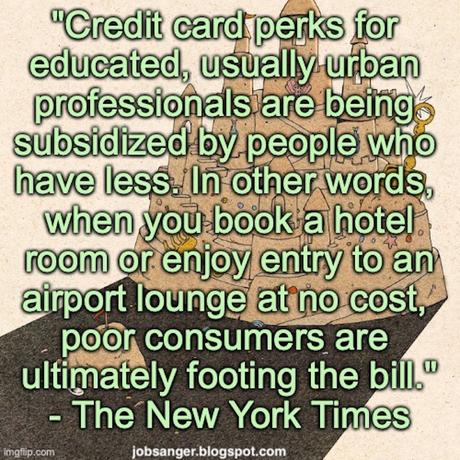
The following is just part of a New York Times article by Chenzi Xu and Jeffrey Reppucci:
There’s an undeniable feeling of excitement when you turn your daily credit card swipes at Starbucks into first-class airfare or a weekend jaunt to Costa Rica. Thanks to mobile banking and the ease of autopay, you can scrupulously avoid any additional costs by paying your monthly bill in full. Free flights and exclusive discounts abound.
Something for nothing, right?
Not exactly nothing. Credit card perks for educated, usually urban professionals are being subsidized by people who have less. In other words, when you book a hotel room or enjoy entry to an airport lounge at no cost, poor consumers are ultimately footing the bill.
Demand for rewards is only going up. In 2016, Chase launched its Sapphire Reserve card. The card comes with perks, bonuses and points multipliers that for big-spending travelers and diners are worth far more than its steep $550 annual fee. There was so much initial demand that Chase ran out of the metal slabs it prints the cards on. Sapphire’s enormous success set off a credit card perks war, with numerous banks flooding the market with sign-on bonuses worth thousands of dollars.
In 2022, the Federal Reserve published data showing that the cost of rewards, as a share of total transaction volume on credit cards, increased 25 percent from 2015 through 2021. This bonanza has helped affluent professionals flood Instagram with envy-inducing shots of white sand beaches, hotel suites and plush airport lounges.
But these high-income travelers are also less likely to carry balances that incur interest charges and late fees, which traditionally increase profits for card issuers. So, to offset the cost of paying lavish rewards to these consumers, banks have sought to maximize other usage-based revenues.
Enter interchange fees, or the money it costs merchants to accept noncash payments. A recent study at Stanford found that when credit card rewards increase, so do these fees.
The United States now has some of the highest credit card processing costs in the world, typically at 2 percent to 2.25 percent of every purchase. This is eight to nine times as much as the prevailing swipe fee in the European Union. The vast majority of merchants pass these costs on to consumers by charging more for their products — regardless of how one pays.
The result? Lower-income consumers are forced to pay higher prices on the goods they buy, but they rarely receive any benefit from rewards programs, according to the Federal Reserve, which has been tracking the distributional effects of card rewards. Its December 2022 report estimates an annual redistribution of $15 billion in rewards value from poorer people to richer people, from low-education people to highly educated people and from diverse communities to less diverse communities.
Put another way, credit card rewards are essentially a tax on less affluent consumers, who are much more likely to pay for their goods with cash, debit cards or standard credit products that accrue no such rewards.

